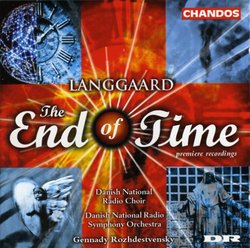| All Artists: Per Høyer, Rued Langgaard, Gennady Rozhdestvensky, Per Salo, Nina Pavlovski, Stig Fogh Andersen Title: Langaard: The End of Time Members Wishing: 0 Total Copies: 0 Label: Chandos Release Date: 2/22/2000 Genre: Classical Style: Opera & Classical Vocal Number of Discs: 1 SwapaCD Credits: 1 UPC: 095115978627 |
Search - Per Høyer, Rued Langgaard, Gennady Rozhdestvensky :: Langaard: The End of Time
 | Per Høyer, Rued Langgaard, Gennady Rozhdestvensky Langaard: The End of Time Genre: Classical |
Larger Image |
CD Details |
CD ReviewsEccentric, Romantic, Must Be Langgaard Thomas F. Bertonneau | Oswego, NY United States | 10/07/2000 (4 out of 5 stars) "With Neeme Järvi's nearly decade-old grouping of the Fourth, Fifth, and Sixth Symphonies (also on Chandos), the present anthology, under Gennady Rozhdestvensky, offers a good introduction to the quirky late-romantic world of the Danish composer Rued Langgaard (1893-1952). Like two Danes of a younger generation, Vagn Holmboe and NielsViggo Bentzon, Langgaard wrote copiously; unlike them, he received only sporadic attention during his frustrated lifetime and never really became a central figure in Danish music. Langgaard felt a good deal of resentment over what he considered his exclusion and this resentment tended to focus on Carl Nielsen. Hence the shortest and oddest of the items in the present program, the brief orchestral-choral piece called, after its single line of verse, sung over and over ad infinitum, "Carl Nielsen: Vår Store Komponist" ("Our Great Composer"), written in 1948. "Interdict" (1947/48) is a tone-poem for orchestra with organ; the program reflects Langgaard's sense of loneliness as the Cathdral organist at Ribe, a provincial post. The language mixes Liszt, Wagner, and Richard Strauss, but the accent is Danish and it is Langgaard's own. The largest offering is a cantata, "Endens Tid" ("The End of Time" or "The End-Time" [1939]), reworked from the opera "Antikrist," which occupied the composer for most of his active life. In four sections, the conception is symphonic, with the orchestra often bearing much of the burden; the final section, "Katastrofen," when the Antichrist actually succeeds in destroying the world, rivals the final scene of Berlioz's "La Damnation de Faust" in raising one's gooseflesh. We also get to hear a setting from "The Song of Solomon." Anyone partial to twentieth century continuations of the romantic tradition in music will find nourishment in Rued Langgaard and in this disc. (If it appeals to you, seek out "Sfaerenes Musik," also on Chandos, and "Sinfonia Interna," on Da Capo.)"
|
